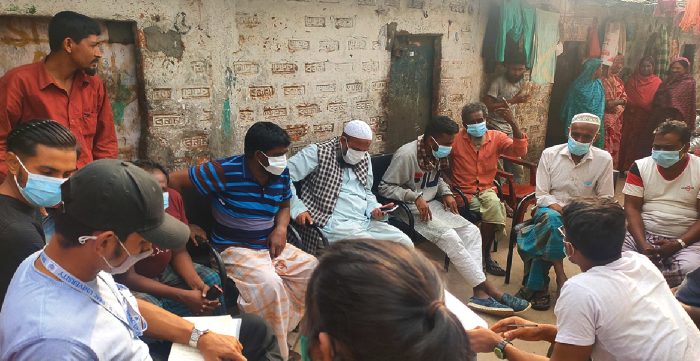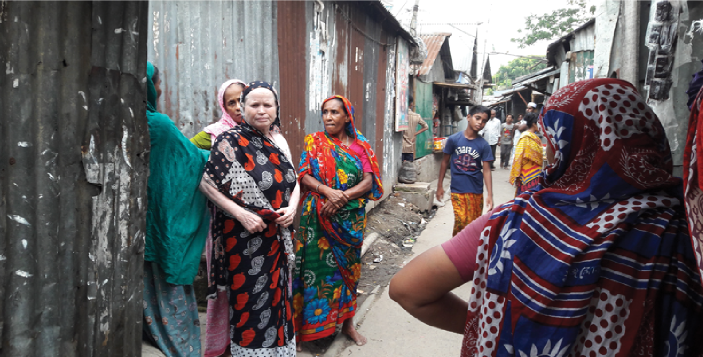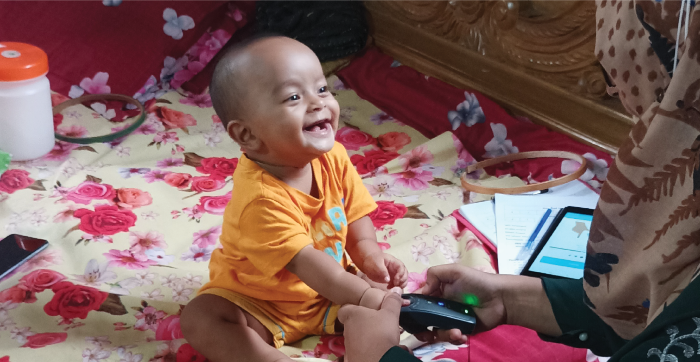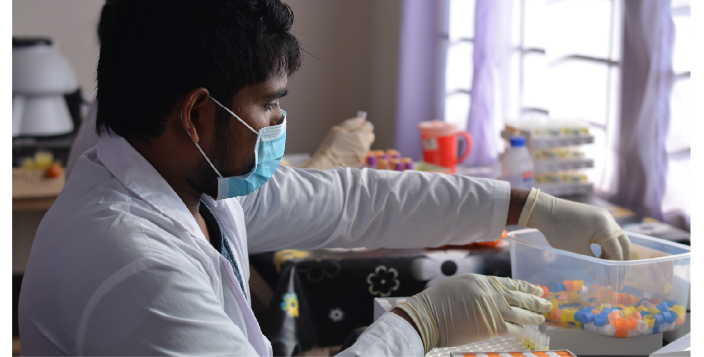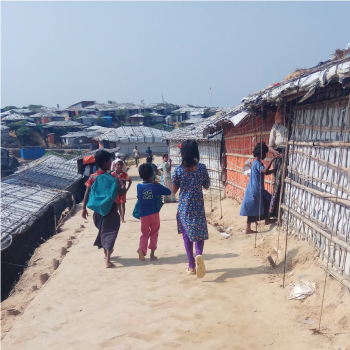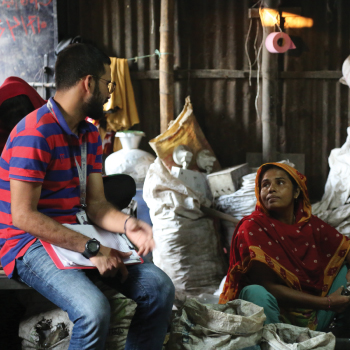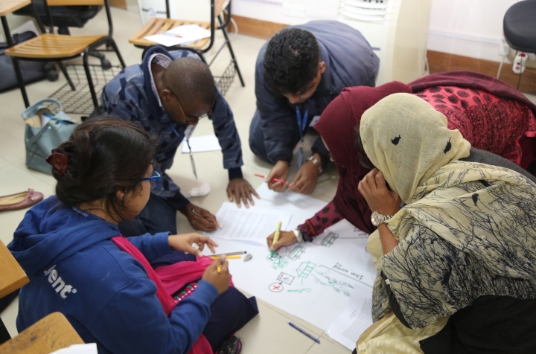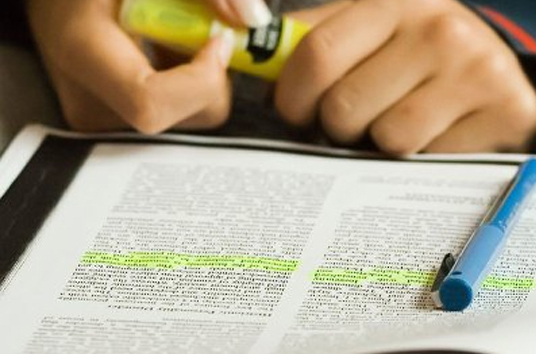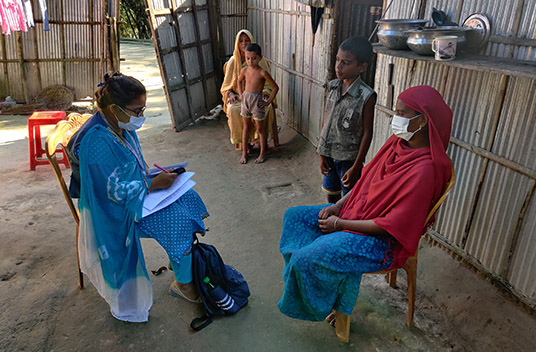Research Projects
Peer-reviewed articles published in International Journals since 2017
International Research Partners
Peer-reviewed Publications on average per year
Through the School’s extensive global and national partnerships and networks, multi-disciplinary research teams lead the 5 Research Centres and 3 Research Hubs covering a range of areas including: urban and rural health, socioeconomic development, poverty, marginalised communities (i.e. refugees, slum dwellers, ethnic minorities, sexual minorities, persons with disabilities, adolescents), infectious diseases, non-communicable diseases, nutrition, gender equity and rights, maternal and child health, urban equity, sexual and reproductive health and rights, digital health, sexuality, violence against women and children, human rights, health systems and workforce, anti-microbial resistance, health equity, healthcare financing, and financial inclusion and wellbeing in urban and rural areas in the country.
In order to address emerging and complex national and global health challenges, the School has also been conducting cutting-edge research that transcends disciplinary boundaries which recently includes emerging infectious diseases, climate change and environment, energy, health informatics, mental health, migration, passive cooling, genetic epidemiology, health technologies, artificial intelligence, and clinical research. We work closely with Government, BRAC, and other service delivery organisations, key stakeholders, civil society.
The diverse range of research methodologies at the School:
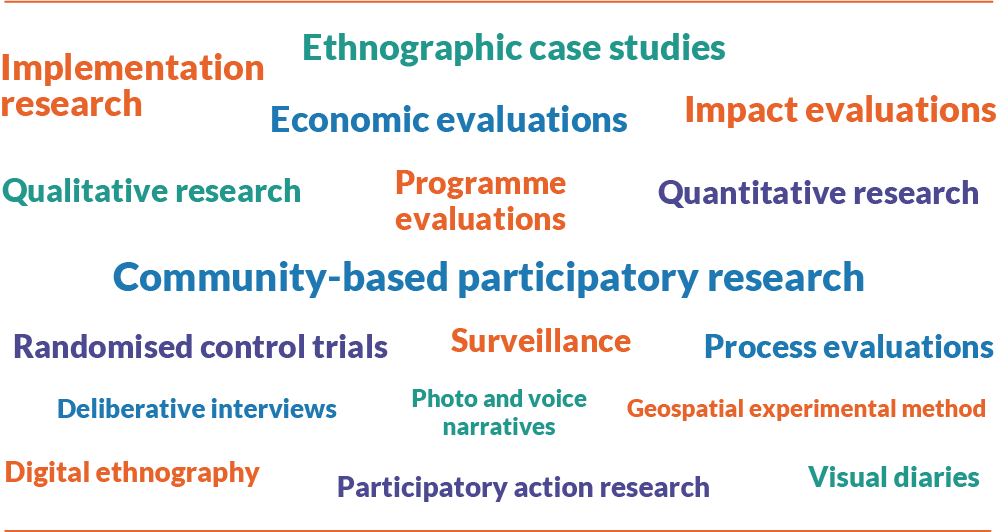
Research Centres of Excellence
Under the School’s 5 Centres of Excellence the research projects investigate the most pressing public health needs of the country, identify evidence-based solutions, and influence policy and programmes.
Research and policy Hubs
The School launched three new Hubs to encourage researchers and development professionals to explore dynamic approaches to collaborative research for impact on policies and practice. The Hubs bring together the expertise of in-house experts and advisors to strengthen the capacity of researchers and development professionals in Bangladesh and in the region.
Research Impact Highlights: Co-Production of Knowledge
WORKING WITH THE GOVERNMENT OF BANGLADESH
The School has partnered with different ministries and bodies of the Government of Bangladesh, including the Ministry of Women and Children’s Affairs, Ministry of Food, Ministry of Health and Family Welfare (MoHFW), Expanded Programme on Immunization (EPI), Cabinet Division, Department of Social Services, MoHFW; to improve public health outcomes in the country. The partnership aims to develop and implement effective health policies, enhance health systems and provide quality health education and research to inform policies and programmes. Through these collaborations, the School works towards improving access to healthcare and reducing health inequalities in Bangladesh.

Introducing the First-Ever Model Pharmacy and Drug Shop Initiative
The research was conducted to map private sector drug shops as part of the Bangladesh Pharmacy Model Initiative (BPMI) programme of Accredited Drug Seller (ADS) project in partnership with the Directorate General of Drug Administration (DGDA), Ministry of Health and Family Welfare, and Management Science for Health (MSH)
Based on the evidence, a model pharmacy and drug shop initiative began and was later scaled up across all the districts in the country
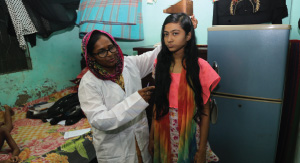
Prioritising Adolescent Nutrition in the 8th Five-Year Plan
Research in 2020 on under and over-nutrition among adolescents in Bangladesh, with a cost-benefit analysis of 6 adolescent nutrition interventions
Research in 2020 on under and over-nutrition among adolescents in Bangladesh, with a cost-benefit analysis of 6 adolescent nutrition interventions
Provided key findings to the Planning Ministry for policy change
Exploring Feasibility of Implementing Trauma Registry (TR) and Trauma Systems Improvement Programme (TSIP) in District Hospitals of Bangladesh
In 2021-2022, for the first time ever in Bangladesh, the School conducted the feasibility study of implementation of TR and TSIP in 4 districts (Bogra, Cumilla, Tangail and Jhenaidah) with high incidence of RTIs
The study was conducted in partnership with the Health Service Division, Ministry of Health and Family Welfare
Evidence generated will facilitate GoB to scale up the TR and TSIP in health facilities in the country
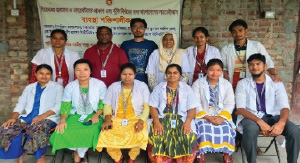
South Asia Biobank Strengthening Non- Communicable Disease Surveillance (2021 - 2023)
30 Surveillance sites across Bangladesh to quantify cardiovascular diseases and Type 2 Diabetes burden and their risk factors through assessments on a representative sample of up to 30,000 people
In partnership with the Directorate General of Health Services, Ministry of Health and Family Welfare
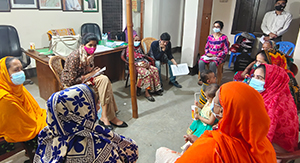
Situation Analysis and Design Support for Enabling Digital Financial Inclusion and Women’s Economic Empowerment in Vulnerable Women Benefit Programme in Urban Areas
The research was conducted in partnership with the Ministry of Women and Children Affairs, World Food Programme (WFP) and Lightcastle Partners
Aims to understand the overall situation of digital financial inclusion, women’s empowerment, and digital cash, taking into account possible opportunities, the bottlenecks, and how to address them
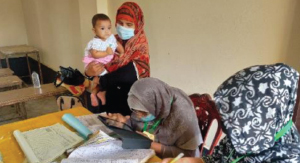
Scaling-up of the GoB’s e-Tracker system for digital documentation of child vaccination
Implementation research in 2021-2022 funded by UNICEF to document and explore the app-based individual e-Tracker system used for vaccinating children in areas of Dhaka and Moulvibazar and identify challenges, lessons learnt, solutions to scale-up, and success stories
Training, resource mobilisation, field monitoring, challenges at the field level, and acceptance of the new system by health managers, health workers and beneficiaries were also reviewed
Developing and Testing of an Upazila-Specific Model of ‘Whole-of-Government’ and ‘Whole-of-Society’ Approaches for the Prevention of Non-Communicable Diseases
Research funded by the Ministry of Health and Family Planning on research and evaluation of the Government’s Multisectoral Action Plan for Prevention and Control of Non-Communicable Diseases 2018- 2025 at the upazila level
Primary landscape analysis conducted in Birganj upazila of Dinajpur district
85 qualitative interviews were conducted among Government officials, representatives of the local government, health workers, members of civil society, and other stakeholders of the upazila
Pathways to Equitable Healthy Cities
A multi-country research project funded by Wellcome Trust, being conducted in 6 cities of 5 countries (Bangladesh, Canada, Ghana, UK, and China)
The project aims to contribute to policies regarding the health impact of different urban environments, engage and build the capacity of stakeholders, and develop an analytical framework for Dhaka city
In September 2022, a series of “Knowledge Co-production Workshops for an Equitable Healthy Dhaka City” was organised to address the lack of women's participation in designing transport systems and air and noise pollution in Dhaka city. Additional secretaries from the Ministry of Health and Family Welfare, Road Transport and Bridges Ministry, and Ministry of Environment, Forest, and Climate Change attended the workshops
Qualitative Assessment of Barriers to Female Birth and Death Registration in Bangladesh (CRVS)
This study, led by the Cabinet Division and supported by Vital Strategies (Singapore), aims to improve overall CRVS programme performance in Bangladesh
The study explored the experiences and perceptions of implementers, policymakers, and community members
Using the findings, the School is now designing a gender-focused module to incorporate into the training curriculum for civil registration staff Transforming Households with Refraction and Innovative Financial Technology (THRIFT)
The project, in partnership with the Department of Social Science, Ministry of Family and Welfare, aims to increase participation of the poor, elderly and widows in Bangladesh in accessing Old Age Allowance and Widow Allowance to better manage finances through digital technology
Through participation in the study, beneficiaries are expected to have improved digital literacy and the freedom to manage their own finances through the Bkash app for banking
WORKING WITH BRAC
The School continues to work in close collaboration with BRAC, which is the world’s biggest NGO, reaching over 100 million people in Bangladesh and operating in 11 countries in Africa and Asia. The School collaborates with BRAC on a regular basis, generating evidence and policy recommendations on BRAC programmes.
In the last 5 years, the School has worked on 55 projects with BRAC to translate evidence into action and policy.
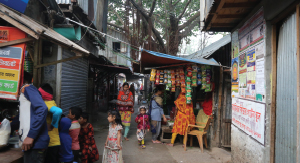
ARISE | Accountability and Responsiveness in Informal Settlements for Equity
Multi-consortium grant in 4 countries in Africa, Asia, and the UK, funded by Global Challenges Research Fund, UK Research and Innovation (UKRI)
Working in partnership with BRAC Urban Development Programme
Working with communities in 3 urban informal settlements in Dhaka and 2 climate-affected settlements in Khulna and Satkhira
Jointly conducting community-based participatory research and GIS Mapping
Co-production with 6 co-researchers living in the communities, and building their capacity
3 regional-level workshops and 2 large-scale stakeholder engagements - presenting evidence on urban informal settlement dwellers and gaps in service interventions
Participants include: Community members, BRAC field staff, representatives from Dhaka South and North City Corporation, Ward Councillors, Government agencies i.e. WASA, LGED, Urban Primary Health Care Services Delivery Project (UPHCSDP), and other NGOs
Participants include: Community members, BRAC field staff, representatives from Dhaka South and North City Corporation, Ward Councillors, Government agencies i.e. WASA, LGED, Urban Primary Health Care Services Delivery Project (UPHCSDP), and other NGOs
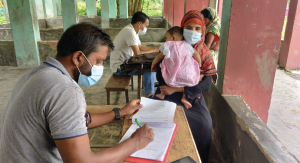
Assess future preparedness for pandemic management in Bangladesh
To assess the future preparedness for pandemic management in Bangladesh, the School is implementing a project with BRAC funded by UNFPA. The project is being conducted in 2 locations - Kishoreganj and Dhaka (declared red zone during the first wave of the pandemic) and Cox’s Bazar as a hard-to-reach area. This project is an extension of the recently completed evaluation of the Community Support Team (CST) intervention provided by BRAC in Cox’s Bazar.
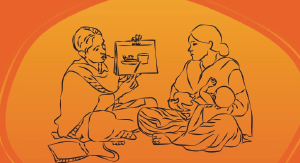
Journey towards Mobile Financial Services (MFS): The BRAC Community Health Worker (CHW) experience
Funded by the Gates Foundation and in partnership with Harvard T.H. Chan School of Public Health
Documentation of BRAC HNPP-CHW’s transition from cash to MFS and scale up
Explored the CHWs’ experience with a focus on time cost efficiency, mental health and women empowerment

Impact evaluation: Stay Safe Online Project
The project by BRAC Education Programme (BEP) aims to educate students of Grades three to eight on internet safety. From October 2022 to February 2023, the researchers at the School conducted an impact evaluation and documented the process of implementing all significant activities from the initiation to the completion of the project
329 teachers were interviewed during baseline and endline studies as part of the quantitative component of the study
31 in-depth-interviews were conducted with teachers and students as part of the qualitative component of the study
8 key informant interviews were conducted with BEP officials, trainers, and government officials and 10 focus group discussions were conducted with teachers, parents, and the community during baseline and endline periods
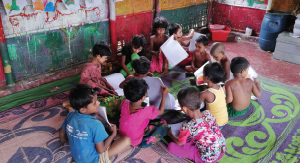
Research on early childhood development in Rohingya camps in Bangladesh through Humanitarian Play Lab (HPL)
Humanitarian Play Lab (HPL) is a play-based learning and healing model for Rohingya children aged 0-6 years old and their caregivers. The project is implemented by BRAC Institute of Educational Development (BRAC IED) and BRAC Humanitarian Crisis Management Programme (HCMP) since 2019. During the last 5 years, the School has conducted 9 process documentations and qualitative studies for the HPL project. Recommendations from these studies have been incorporated by BRAC IED to improve various programme areas.
STRUCTURALLY SILENCED WOMEN AND GIRLS
Women and adolescents’ health has been at the forefront of research at the School. The School has been addressing and generating evidence on crucial issues including SRHR, menstruation, maternal and neonatal and nutrition, adolescent health, cyber safety, and violence against women.
Adolescent girls
Research on adolescent girls’ challenges related to menstruation with Burnet Institute, Australia (2022 - 2025)
Quantifying effects of menstrual health on girls’ education, physical health, mental health, and reproductive health over time
Indigenous women
Assessing digital financial inclusion and economic empowerment with WFP Bangladesh (2022)
Amplifying voices and visibility in online and public spaces with CREA (2022)
Victims of human trafficking
Disrupting cross-border trafficking for sexual exploitation through Prevention, Protection, Prosecution, and Partnership through research project with Children’s Investment Fund Foundation (CIFF) (2020 - 2022)
Gender-diverse communities
In order to contribute to the empowerment of gender-diverse communities and to help foster a space for their voices to be heard, the School has been actively conducting research in partnership with national and international organisations since 2015.
Documenting movement-building for realising the rights of gender- diverse communities with Share-Net International (2017 & 2022)
Fellowship provided to 6 gender-diverse individuals with CREA (2020)
Art for Advocacy initiative in partnership with gender-diverse individuals to empower their voices, supported by CREA (2022)
Persons with disabilities (PWD)
The School has undertaken several projects focused on the creation of new knowledge on disability and explore the needs and rights of Persons with Disability (PWDs) in context of SDGs and the United Nations Convention on the Rights of Persons with Disabilities (CRPD).
The School co-produced with community researchers to conduct research on youth with disability in a project with Sightsavers, UK. Findings shared with the State Minister of Social Welfare (2022)
Research in collaboration with Leonard Cheshire on impact of COVID-19 on education of children with disabilities during school closures in Narsingdi, Taras, and Sirajganj (2022)
The School conducted a nationwide study on SRHR of Persons with Disabilities (PWDs) in Bangladesh (2020 to 2022) in partnership with the Directorate General of Health Services, Ministry of Health and Family Welfare, Government of Bangladesh.
OTHER
Community-led Responsive and Effective Urban Health Systems (CHORUS)
Funded by FCDO, UK, CHORUS is a multi-country research programme consortium being implemented in 4 countries (Bangladesh, Nepal, Ghana, Nigeria) that aims to strengthen urban health systems by addressing practical challenges of delivering equitable health services
In 2022, a series of consultation workshops were arranged with urban health experts, health policymakers, and health care providers to get their ideas, viewpoints, and suggestions for strengthening the urban primary health care system in Bangladesh
Several webinars and training courses were arranged during 2022 on topics such as Implementation research, Quasi-Experimental research methods, Quantitative Data analysis using R, Gender and intersectionality, and Health facility assessment
Managing impact of COVID-19 in Rohingya camps and Host Communities with technological solutions Funded by IDRC, Canada, the project aims to -
Undertake an audit of functioning services to which people of Rohingya and host communities can be referred and establish clear referral protocols
Contextually adapt Dimagi’s contact tracing app to identify high-risk areas for COVID-19 transmission within camps and surrounding host communities
Contextually adapt Dimagi’s CommCare MNCH App for COVID-19 and assess its effectiveness in improving Sexual and Reproductive Health and Maternal, Newborn, and Child Health outcomes in the Rohingya camps and in host communities
Build capacities of BRAC midwives and Community Health Workers (CHW) through in-person and online training and with support from BRAC Humanitarian Crisis Management Programme (HCMP)
Toolkit for Participatory Health Research Methods
ARISE project contributed to developing Toolkit for Participatory Health Research Methods, with consortium partners in 2021. Partners include: Institution Liverpool School of Tropical Medicine (LSTM), UK; Institute of Development Studies (IDS), UK; Institute of Health and Wellbeing, University of Glasgow, UK Slum and Shack Dwellers’ International (SDI); George Institute for Global Health, India; College of Medicine and Allied Health Sciences (COMAHS), Sierra Leone; Urban Research Centre (SLURC), Njala University, Sierra Leone; Liverpool VCT health (LVCT), Kenya; African Population and Health Research Centre (APHRC), Kenya. This toolkit provides step-by-step guidelines for all researchers undertaking community-based participatory research, ensuring equitable and meaningful engagement with communities.
Digital Health and Rights - Participatory Action Research
The Digital Health and Rights Advisory Group is a consortium of anthropologists, human rights lawyers, and global networks of civil society activists who are working together in a participatory action research approach that combines ethnographic research, reflection, analysis and policy engagement. The group addresses HIV, TB, COVID-19 and sexual and reproductive health in Kenya, Ghana, Vietnam, Bangladesh and Colombia. As the country partner in Bangladesh, the School’s faculty and researchers work to assess what legal and policy frameworks are used to implement these digital tools, how they are governed, how human rights concerns are addressed, and how integrated youth and civil society are in decision-making for these tools. One of the major focuses of the group’s activity is empowering transnational youth activist networks with the knowledge, networks, and opportunities to raise recommendations in health policy in national and global health governance. Along with the School, other partners are: Global Health Centre, Graduate Institute, Geneva Project Partners: Global Network of People Living with HIV (GNP), Kenya Ethical & Legal Issues Network on HIV & AIDS (KELIN), STOPAIDS, UK, Centre for Sustainable Healthcare Education at the University of Oslo and Universidad de los Andes, Colombia are partners in the project. Project Fondation Botnar and Open Society University Network (OSUN) are funding the project.
COVID-19 Research
Since the outbreak of COVID-19, the School has conducted 48 rapid quantitative and qualitative research assessments. Populations include: urban poor, rural populations, informal sector.
Know MoreCOVID-19 Research Repository
On June 2021, Bangladesh Health Watch initiated a research repository with the aim to house all COVID-19 related research done in Bangladesh, which is a credible source of information and accessible to all. BRAC JPGSPH serves as the Secretariat for BHW since its inception in 2006.
Explore the Repository
